(完整word版)If 引导的条件状语从句
if 引导条件状语从句

if 引导条件状语从句【最新版】目录1.条件状语从句的定义和作用2.if 引导条件状语从句的用法3.实例分析4.注意事项正文一、条件状语从句的定义和作用条件状语从句是表示某种条件成立时,主句所表达的内容才会实现的从句。
它通常由连词 if 引导,用来表示在某种条件下,主句所述情况是否成立。
条件状语从句在英语中十分常见,具有很强的实用性。
二、if 引导条件状语从句的用法if 引导条件状语从句时,主句通常使用一般将来时,而从句则使用一般现在时。
这种时态搭配是为了表示在某种条件下,将来会发生的事情。
当然,在某些特殊情况下,也可以使用其他时态,例如主句使用一般现在时,从句使用一般将来时。
三、实例分析1.如果明天不下雨,我们会去公园。
(If it doesn"t rain tomorrow, we will go to the park.)在这个例子中,从句“it doesn"t rain tomorrow”表示一种条件,即明天不下雨,主句“we will go to the park”表示在这种条件下会发生的事情,即我们去公园。
2.如果你愿意,我们可以一起去看电影。
(If you are willing, we cango to the movies together.)在这个例子中,从句“you are willing”表示一种条件,即你愿意,主句“we can go to the movies together”表示在这种条件下会发生的事情,即我们一起去看电影。
四、注意事项在使用 if 引导条件状语从句时,需要注意以下几点:1.条件状语从句中的 if 通常可以翻译为“如果”,但有时也可以翻译为“是否”或“是不是”,具体翻译需要根据上下文判断。
2.条件状语从句中的时态搭配要正确,通常为主句一般将来时,从句一般现在时。
3.条件状语从句有时可以省略 if,直接用主句和从句连接,例如:It will be fine if it doesn"t rain.(如果下雨,天气就不会好了。
If引导的条件状语从句
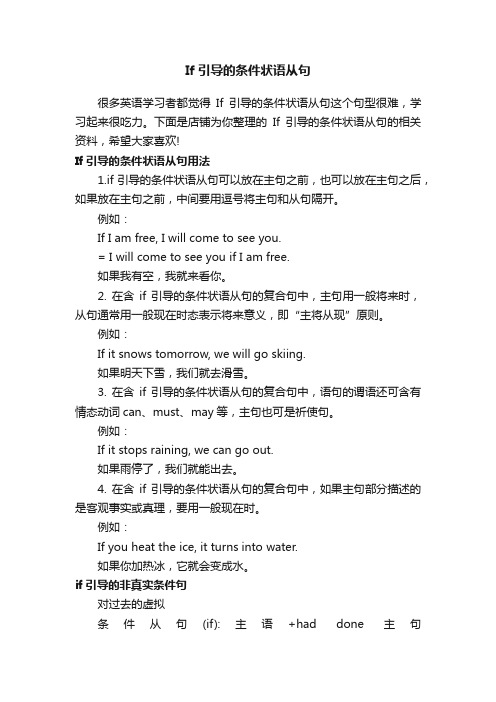
If引导的条件状语从句很多英语学习者都觉得If引导的条件状语从句这个句型很难,学习起来很吃力。
下面是店铺为你整理的If引导的条件状语从句的相关资料,希望大家喜欢!If引导的条件状语从句用法1.if引导的条件状语从句可以放在主句之前,也可以放在主句之后,如果放在主句之前,中间要用逗号将主句和从句隔开。
例如:If I am free, I will come to see you.= I will come to see you if I am free.如果我有空,我就来看你。
2. 在含if引导的条件状语从句的复合句中,主句用一般将来时,从句通常用一般现在时态表示将来意义,即“主将从现”原则。
例如:If it snows tomorrow, we will go skiing.如果明天下雪,我们就去滑雪。
3. 在含if引导的条件状语从句的复合句中,语句的谓语还可含有情态动词can、must、may等,主句也可是祈使句。
例如:If it stops raining, we can go out.如果雨停了,我们就能出去。
4. 在含if引导的条件状语从句的复合句中,如果主句部分描述的是客观事实或真理,要用一般现在时。
例如:If you heat the ice, it turns into water.如果你加热冰,它就会变成水。
if引导的非真实条件句对过去的虚拟条件从句(if):主语+had done 主句might/would/should/could+have done对现在的虚拟if+ 主语+动词过去式(be用were)主句might/would/should/could+do对将来的虚拟if+主语+动词过去式(be用were)或主语+should do或主语+were to do主句 might/would/should/could+doe.g.Tom got to the station in time because he started earlier.If Tom had started late, he would have missed the train.Do you think the thief entered through the door?No, if he had, I don't believe, he would have broken the living room window.If the book weren't so expensive, I would buy it.If you didn't live so far away, we would be able to visit you more.What would you do if you lost your passport in a foreign country?Why hasn't he come? If he should not come on time, we would have to put off the trip.2.注意事项e.g.If she hadn't work hard at English in the past, she wouldn't work as well as a secretary in a large company now. 混合时间的虚拟语气从句为对过去的虚拟,主句是现在。
if引导的条件状语从句总结(精)
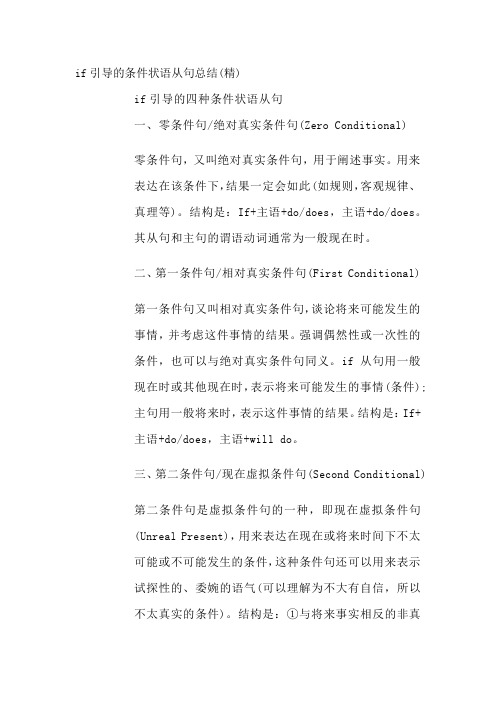
if引导的条件状语从句总结(精)if引导的四种条件状语从句一、零条件句/绝对真实条件句(Zero Conditional)零条件句,又叫绝对真实条件句,用于阐述事实。
用来表达在该条件下,结果一定会如此(如规则,客观规律、真理等)。
结构是:If+主语+do/does,主语+do/does。
其从句和主句的谓语动词通常为一般现在时。
二、第一条件句/相对真实条件句(First Conditional)第一条件句又叫相对真实条件句,谈论将来可能发生的事情,并考虑这件事情的结果。
强调偶然性或一次性的条件,也可以与绝对真实条件句同义。
if从句用一般现在时或其他现在时,表示将来可能发生的事情(条件);主句用一般将来时,表示这件事情的结果。
结构是:If+主语+do/does,主语+will do。
三、第二条件句/现在虚拟条件句(Second Conditional)第二条件句是虚拟条件句的一种,即现在虚拟条件句(Unreal Present),用来表达在现在或将来时间下不太可能或不可能发生的条件,这种条件句还可以用来表示试探性的、委婉的语气(可以理解为不大有自信,所以不太真实的条件)。
结构是:①与将来事实相反的非真实条件句是If+主语+should do/were to do/did,主语+would/should/could/might do;②与现在事实相反的非真实条件句是If+主语+did,主语+would/should/could/might+do。
四、第三条件句/过去虚拟条件句(Third Conditional) 第三条件句是表示与过去事实相反的虚拟语气,是用来表达如果(If)当时那样发生,另外一方面(当时)结果会如何。
通常是指过去的事情,带有一切已经太迟而不能够补救的意思。
结构是:If+主语+had done,主语+would/should/could/ might+have done。
if 条件句的时态搭配1.if从句用一般现在时,主句用一般将来时2.if从句用一般现在时,主句用may/might/canIf the fog gets thicker the plane may/might be diverted.3.if从句用一般现在时,主句用must/shouldIf you want to lose weight you must/should eat less bread.4.if从句用一般现在时,主句用一般现在时5.if从句用现在进行时,主句用一般将来时6.if从句用现在完成时,主句用一般将来时If you have finished dinner I’ll ask the waiter for the bill.。
if引导的条件状语从句与专题练习(可编辑修改word版)

if 引导的条件状语从句引导条件状语从句最常用的连词是if ,常见的 if 条件状语从句表示在某条件下某事很可能发生。
如:If you ask me ,I will answer you.If it rains tomorrow, I will stay at home.I will stay at home if it rains tomorrow.另外, if 从句还表示不可实现的条件或根本不可能存在的条件,也就是一种虚拟的条件或假设。
从句多用一般过去时或过去完成时,表示对现在或过去的一种假设。
如:If I were in university ,I would ⋯.If I had enough money ,I would buy a car.1.i f 从句用一般现在时,主句用一般将来时If he runs , he’ll get there in time.2.i f 从句用一般现在时,主句用 may/might/can/must If the fog getsthicker the plane may/might be diverted.3.i f 从句用一般现在时,主句用一般现在时If you heat ice it turns to water. (也可用 will turn)4.if 从句用现在进行时,主句用一般将来时If you are looking for Peter you ’ ll find him upstairs.5.if 从句用现在完成时,主句用一般将来时If you have finished dinner I ’ ll ask the waiter for the bill.一、用所给词的适当形式填空1.If you (feel) tired, you (have) to have arest.3. If there (be) fewer trees, there ( be) more pollution.5.If Marcia (live) alone, she( keep) a pet parrot.na ( buy) a new dress if the old one(be) out of style.9.Peter ( send) me a beautiful souvenir if he(tour) Spain.10.If Mr Green (say) I am hard- working, my parents( feel) glad.11.I (go) to the beach if it ( not rain)this week.13.H e (write) a letter to his grandparents if he (get) his reportcard this week.14.If she (get) up late, she ( not catch)the early bus.15.Peter (major) in English if he (pass) the exams in Peking University.16.如果努力学习,你就会取得好成绩。
初中英语If引导的条件状语从句(可编辑修改word版)
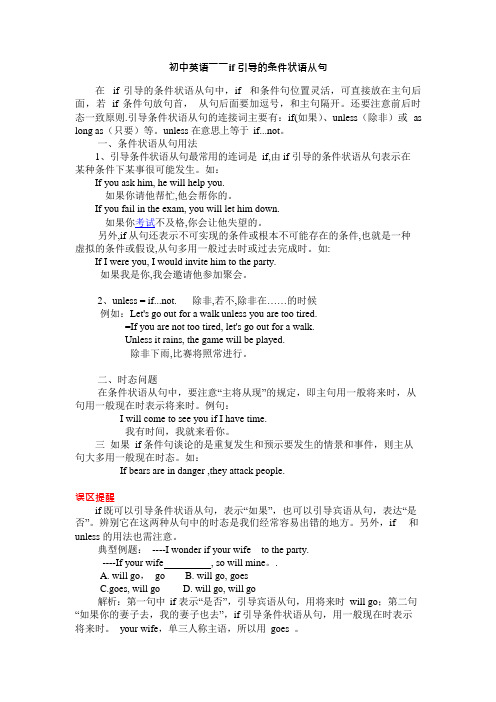
初中英语――if 引导的条件状语从句在if 引导的条件状语从句中,if 和条件句位置灵活,可直接放在主句后面,若if 条件句放句首,从句后面要加逗号,和主句隔开。
还要注意前后时态一致原则.引导条件状语从句的连接词主要有:if(如果)、unless(除非)或as long as(只要)等。
unless 在意思上等于if...not。
一、条件状语从句用法1、引导条件状语从句最常用的连词是if,由if 引导的条件状语从句表示在某种条件下某事很可能发生。
如:If you ask him, he will help you.如果你请他帮忙,他会帮你的。
If you fail in the exam, you will let him down.如果你考试不及格,你会让他失望的。
另外,if 从句还表示不可实现的条件或根本不可能存在的条件,也就是一种虚拟的条件或假设,从句多用一般过去时或过去完成时。
如:If I were you, I would invite him to the party.如果我是你,我会邀请他参加聚会。
2、unless = if...not. 除非,若不,除非在……的时候例如:Let's go out for a walk unless you are too tired.=If you are not too tired, let's go out for a walk.Unless it rains, the game will be played.除非下雨,比赛将照常进行。
二、时态问题在条件状语从句中,要注意“主将从现”的规定,即主句用一般将来时,从句用一般现在时表示将来时。
例句:I will come to see you if I have time.我有时间,我就来看你。
三如果if 条件句谈论的是重复发生和预示要发生的情景和事件,则主从句大多用一般现在时态。
总结好的:if引导的条件状语从句

总结好的:if引导的条件状语从句if引导的条件状语从句if1) ⽤法:(1)条件状语从句通常由连词if引导,意为“如果、假如”,主句不能⽤be going to表⽰将来,⽽应该⽤shall,will。
If you leave now, you are never going to regret it. (错误)If you leave now, you will never regret it. (正确)(2)if “如果”,引导条件状语从句,主句⽤⼀般将来时,从句则⽤⼀般现在时,如:If it rains tomorrow, I shan’t climb the hills.(3)另外,主句是祈使句或含有情态动词,从句也⽤⼀般现在时。
如:Please call me if he comes next Sunday.Can you call the policeman if you are in the trouble.注意宾语从句中的if与条件状语从句if的区别。
宾语从句中的if“是否”相当于whether,引导宾语从句,时态需根据语境确定。
如果主句⽤⼀般现在时,从句可以根据具体情况选⽤时态,如果主句⽤⼀般过去时,从句必须⽤过去式的某种形式。
I don't know if it will rain tomorrow. 我不知道明天是否会下⾬。
Our teacher said there was going to be a football match the next month.我们说下⽉将有场⾜球⽐赛。
【边学边做】⽤括号内所给词的正确形式填空。
1. What will you buy if you ________(have)a lot of money?2. If it ________(not snow)tomorrow, we will feel unhappy.3. You mustn’t go to school if you ________(be)still in bed.4. If he _______(be)at home at that time, he would know it.5. Please show me the way if you ________(know)it.6. You will hurt your teeth if you ________(eat)too much candy.7. If you gave me a toy car, I _________(be)very happy.8. I would get the prize if I _________(work)hard.9.If she ______ (finish ) work early ,she ______(go) home.10.If the weather______(be)fine,we_______(go)for a walk .11. If I_____(have) time tonight ,I _______(finish) the book I’m reading.12. If it ______(rain) next weekend , we_______(not be able to ) plant the vegetable .13. If it_______(rain),we______(stay) at home .14.If she______(arrive) ,she _____(phone) me .15. If he_____(call),tell him I’ll ring back .⼆、⽤所给词的适当形式填空1. If you ________(feel) tired, you _________ (have) to have a rest.2. Where _____ he ____(see) the film if he _________(have) time?3. If there ____ (be) fewer trees, there _______ (be) more pollution.4. He ___ (dress) more casually if he ___ (not work) on weekends.5. If Marcia _______ (live) alone, she _______ (keep) a pet parrot.6. Lana _____ (buy) a new dress if the old one ____ (be) out of style.7. The twins _______ (fight) if they__________ (argue).8. I ______ (have) a bake sale if I ____ (need) money for education.9. Peter ____ (send) me a beautiful souvenir if he ____(tour) Spain.10. If Mr. Green _______ (say) I am hard- working, my parents ___ (feel) glad.11. I ______ (go) to the beach if it________ (not rain) this week.12. _____they ___ (have) a match if the P.E. teacher __ (be) busy?13. He ____ (write) a letter to his grandparents if he ____ (get) his report card this week.14. If she ______ (get) up late, she _____ (not catch) the early bus.15. Peter ____ (major) in English if he ____(pass) the exams in Peking University.⼆、完成句⼦1. 他如果看电视太久了,他的⽗母会不⾼兴。
if引导的非真实性条件状语从句即虚拟语气(可编辑修改word版)

if 引导的非真实性条件状语从句即虚拟语气通过动词形式的变化来表示说话人对发生的动作或存在的状态所持的态度或看法的动词形式称为语气。
.英语中的语气分三种:陈述语气、祈使语气、虚拟语气。
虚拟语气表示说话人所说的话不是事实,而是一种祝愿,建议,与事实相反的假设或实际可能性不大的情况等(即非真实的假设)。
If 引导的条件状语从句分为真实和非真实条件句(虚拟条件句)。
真实条件句表示在假设的条件下,有可能实现的情况。
非真实条件句表示的是假设的或实际可能性不大的情况,故采用虚拟语气。
If he doesn’t hurry up, he will miss the bus.( 真实条件状语)If he was free, he asked me to tell stories.(真实条件状语)If I were you, I would go at once.(非真实条件状语从句)If there was no air, people would die.(非真实条件状语从句)1)非真实条件句中虚拟语气的基本形式。
假设类型条件从句的动词结果主句的动词与现在事实相反动词过去式(be 只用were)would/should/could/might + 动词原形与过去事实相反had+过去分词would/should/could/might +have + 过去分词与将来事实相反动词过去式/(should/were to)+动词原形wo u l d/s h o u l d/c o u l d/m i g h t + 动词原形①与现在事实相反If I had time, I would go for a walk.如果我有时间,我就会去散步。
(实际情况:我现在没有时间,也不会去散步。
)If I were you, I would take an umbrella.假如我是你的话,我会带上雨伞。
(事实上我不可能是你。
)I would say no if someone asked me to be in a movie.假如有人请我当电影演员,我会表示拒绝。
If引导的条件状语从句

编辑课件
4
变换:
1.有if引导的条件状语从句的复合句中,当主句和从句的 主语均为you时,可转换为“祈使句,and+简单句”或
“祈使句,or+简单句”
You can pass the exam if you work hard. Work hard ----------------,and you will pass the exam.
for you , it will be good for your study.
编辑课件
12
5. If you __d_o_n_’_t _w_o_rk___(not work ) hard , you _w_o_n_’_t _p_as_s_(not pass) the exam.
6. If she __m__e_n_d_s_(mend) the computer , her father __w_o_n_’t_b_l_am__e_(not blame ).
W--i-t-h--y--o-u--r--h--e-l-p-, I’ll finish my job soon. 如果你帮我,我将很快完成我的工作。 If there is no water, fish may die.
Fish may die w--i-th--o--u-t--w--a--t-e-r--. 如果没有水,鱼可能会死。
I won’t go there unless I hear from you.(同义 if 句) don’t
I won’t go there _____ I _____hear from you. I won’t go to the party if I am not invited. (同义 句) unless I won’t go to the party_____ I am invited.
(完整word版)if引导的条件状语从句讲解和练习(答案)

条件状语从句一、条件状语从句通常由if(如果), unless(除非),as long as(只要)引导。
例如:If it rains tomorrow, we won't go to the park. 如果明天下雨,我们就不去公园了。
Unless weather stops me, I go for a walk every. 我每天都会去散步,除非遇上坏天气。
Our parents will be pleased with our performance as long as we try our best。
小试牛刀:1、只要我们竭尽全力,父母就会满意我们的表现.Our parents will be pleased with our performance _____ _____ ______ we try our best。
2、如果人人为保护环境做出贡献,世界将会变得更美好。
______ ______ ______ _____ _______ to protecting the environment, the world will become much more beautiful.二、if引导的条件状语从句(1)“if从句+祈使句”的句子。
其实,if作为一个连词,主句也可以是其他形式的句子。
例如:If you want to go, please let me know。
If the green light isn’t on, wait for a minute。
(2)“祈使句 + and (or)+ 陈述句” 在意思上相当于一个带有条件状语从句的复合句。
注意:A. “祈使句 + and + 陈述句”可以转化为if引导的肯定条件状语从句,而且主语是第二人称.B. “祈使句 + or + 陈述句”可以转化为if引导的否定条件状语从句,而且主语是第二人称。
例如:Study hard and you will pass the exam。
(完整版)if引导的条件状语从句-虚拟语气

虚拟语气是一项语法难点,为了让学员们便于理解与记忆,我们把虚拟语气分成三大块来讨论:1.名词从句中的虚拟语气标志词+should+动词原形2.条件从句中的虚拟语气①三种基本态②倒装虚拟句③混时虚拟句④含蓄虚拟句⑤跳层虚拟句3.其它情形中的虚拟语气(wish/would rather/It’s high time…/If only…/lest)一.三种基本形态(1)表虚拟的时间if从句谓语形式主句谓语形式现在:did / were would (should, might, could)+do过去:had done/ had been would (should/might/could)+have done(been)将来:were to/ should+do would (should, might, could)+do三种基本形态(2)(这是基础,建议牢记下面的例句,争取能脱口而出)与现在事实相反:If I had enough money, I would buy a book.与过去事实相反:If I had had enough money, I would have bought a book.与将来事实相反:If I were to have enough money, I would buy a book.If I should have enough money, I would buy a book.二、倒装虚拟句(只能与过去/将来事实相反,省去if,只有三种倒装形式)Had I had enough money, I would have bought a book.Were I to have enough money, I would buy a book.Should I have enough money, I would buy a book.三、混合时间虚拟语气(主要是抓住时间状语)(对过去事实虚拟+对现在事实虚拟)If I had studied English at school, I could read the English novel now.(对现在事实虚拟+对过去事实虚拟)If she were not so careless, she wouldn’t have made such a mistake.四、含蓄虚拟句(在四级考试中目前还未出现此考点,但在阅读中常见)3. 虚拟语气用在主语从句中。
If引导的条件状语从句

• 注意事项 • 1. 在if引导的条件状语从句中,当主句是一般将
来时时,不能够使用be going to结构,而要用 will。 • 例如: I’ll help you with your English if I am free tomorrow. 如果明天我有空,我会帮你学英 语。
• 2. 在if引导的条件状语从句中不能够使用some, 而要用any。
I won’t go there _____ I _____hear from you. I won’t go to the party if I am not invited. (同义 句) unless I won’t go to the party_____ I am invited.
变换:
If 引导的宾语从句的时态由主句及本身时 态决定;
2.If it doesn’t rain , we’ll hold it.
If 引导条件状语从句的时态为一般现在时 记住“主将从现”
1 If I _d_o_n_’_t _u_n_d_e_rs_t_an_d__(not understand), I will ask my teacher for help .
7. If your brother ____b_r_e_a_ks____(break) the window , he will feel very sorry for that .
8. If the computer doesn’t work (not work), mend it please .
知识回顾 Knowledge Review
放映结束 感谢各位批评指导!
谢 谢!
让我们共同进步
11. If you ___a_re_____(be) happy , we will be happy .
(完整word版)初中英语If引导的条件状语从句.docx
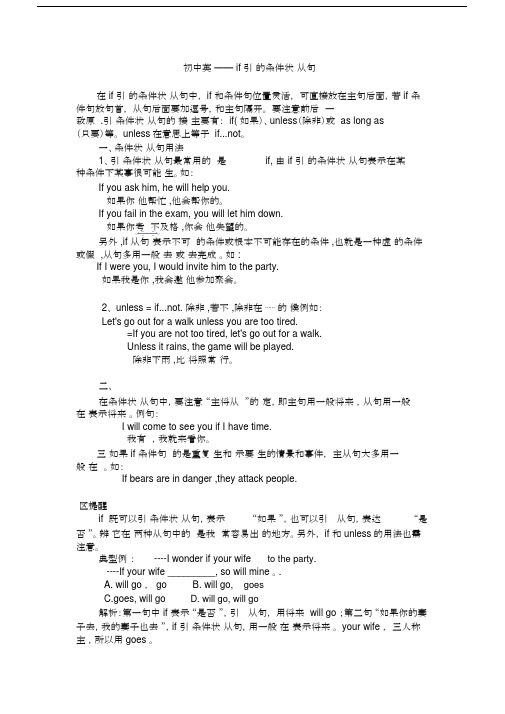
初中英―― if 引的条件状从句在 if 引的条件状从句中, if 和条件句位置灵活,可直接放在主句后面,若 if 条件句放句首,从句后面要加逗号,和主句隔开。
要注意前后一致原 .引条件状从句的接主要有: if( 如果)、unless(除非)或 as long as(只要)等。
unless在意思上等于 if...not。
一、条件状从句用法1、引条件状从句最常用的是if, 由 if 引的条件状从句表示在某种条件下某事很可能生。
如:If you ask him, he will help you.如果你他帮忙 ,他会帮你的。
If you fail in the exam, you will let him down.如果你考不及格 ,你会他失望的。
另外 ,if 从句表示不可的条件或根本不可能存在的条件 ,也就是一种虚的条件或假 ,从句多用一般去或去完成。
如 :If I were you, I would invite him to the party.如果我是你 ,我会邀他参加聚会。
2、 unless = if...not. 除非 ,若不 ,除非在⋯⋯的候例如:Let's go out for a walk unless you are too tired.=If you are not too tired, let's go out for a walk.Unless it rains, the game will be played.除非下雨 ,比将照常行。
二、在条件状从句中,要注意“主将从”的定,即主句用一般将来,从句用一般在表示将来。
例句:I will come to see you if I have time.我有,我就来看你。
三如果 if 条件句的是重复生和示要生的情景和事件,主从句大多用一般在。
如:If bears are in danger ,they attack people.区提醒if 既可以引条件状从句,表示“如果”,也可以引从句,表达“是否”。
if条件状语从句 -【完整版】
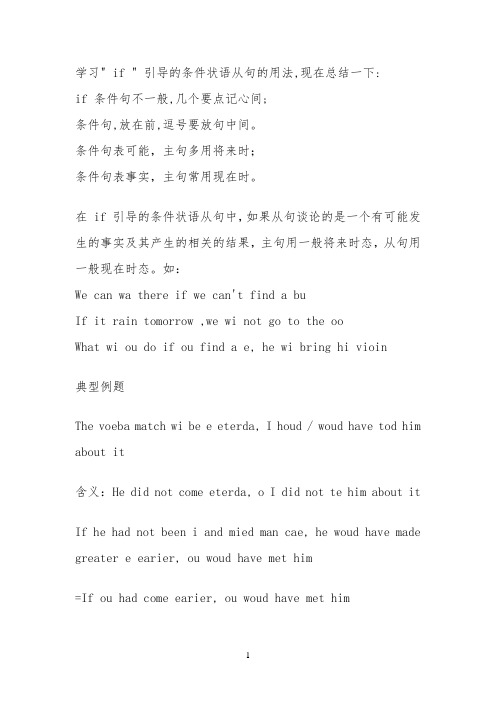
学习" if " 引导的条件状语从句的用法,现在总结一下:if 条件句不一般,几个要点记心间;条件句,放在前,逗号要放句中间。
条件句表可能,主句多用将来时;条件句表事实,主句常用现在时。
在 if 引导的条件状语从句中,如果从句谈论的是一个有可能发生的事实及其产生的相关的结果,主句用一般将来时态,从句用一般现在时态。
如:We can wa there if we can't find a buIf it rain tomorrow ,we wi not go to the ooWhat wi ou do if ou find a e, he wi bring hi vioin典型例题The voeba match wi be e eterda, I houd / woud have tod him about it含义:He did not come eterda, o I did not te him about itIf he had not been i and mied man cae, he woud have made greater e earier, ou woud have met him=If ou had come earier, ou woud have met himShoud it rain, the croe to our meeting tomorrow2)在宾语从句中的应用在表示命令、建议、要求等一类动词后面的从句中。
order, ugget, mand, init houd doI ugget that we houd hod a meeting net weeHe inited that he houd be ent there注意:如ugget, init不表示"建议" 或"坚持要某人做某事时",即它们用于其本意"暗示、表明"、"坚持认为"时,宾语从句用陈述语气。
If-引导的条件状语从句
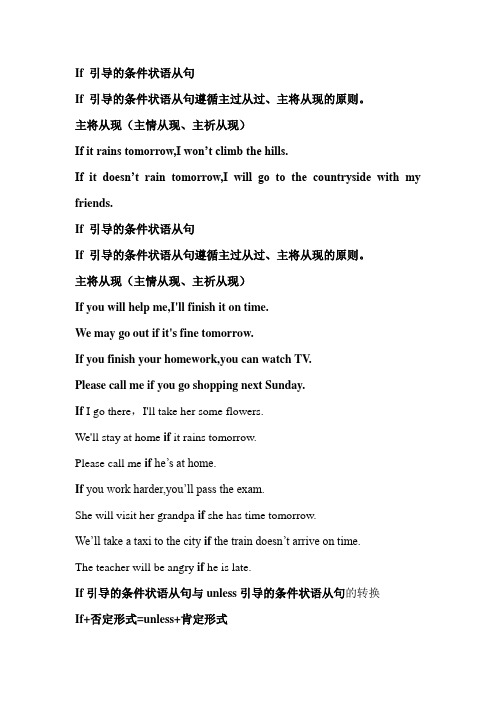
If 引导的条件状语从句If 引导的条件状语从句遵循主过从过、主将从现的原则。
主将从现(主情从现、主祈从现)If it rains tomorrow,I won’t climb the hills.If it doesn’t rain tomorrow,I will go to the countryside with my friends.If 引导的条件状语从句If 引导的条件状语从句遵循主过从过、主将从现的原则。
主将从现(主情从现、主祈从现)If you will help me,I'll finish it on time.We may go out if it's fine tomorrow.If you finish your homework,you can watch TV.Please call me if you go shopping next Sunday.If I go there,I'll take her some flowers.We'll stay at home if it rains tomorrow.Please call me if he’s at home.If you work harder,you’ll pass the exam.She will visit her grandpa if she has time tomorrow.We’ll take a taxi to the city if the train doesn’t arrive on time.The teacher will be angry if he is late.If引导的条件状语从句与unless引导的条件状语从句的转换If+否定形式=unless+肯定形式You won’t pass the exam if you don’t work hard.=You won’t pass the exam unless you work hard.If you don’t go to bed earlier,you will feel tired in the morning. =Unless you go to bed earlier,you will feel tired in the morning. If it doesn’t rain,he will play with me tomorrow.=Unless it rains,he will play with me tomorrow.If she doesn’t come,I’ll go shopping alone=Unless she comes,I’ll go shopping alone.if条件状语从句与祈使句,and/or+一般将来时的句子转化If you get up early,you’ll get there on time.=Get up early,and you’ll get there on time.=Get up early,or you won’t get there on time.If you get up early,you won't be late for school.=Get up early,and you won't be late for school.=Get up early,or you will be late for school.If you don’t get up early,you won’t catch up with the early bus. =Get up early,and you will catch up with the early bus.=Get up early,or you won’t catch up with the early bus.if条件状语从句与without的句子转化If there is no water,we can't live.=We can't live without water.If there is no water,fish will die.=Fish will die without water.If you help me,I’l l finish the work soon.=With your help,I finish the work soon.if条件状语从句与祈使句,and/or+一般将来时的句子转化If you get up early,you’ll get there on time.=Get up early,and you’ll get there on time.=Get up early,or you won’t get there on time.If you get up early,you won't be late for school.=Get up early,and you won't be late for school.=Get up early,or you will be late for school.If you don’t get up early,you won’t catch up with the early bus.=Get up early,and you will catch up with the early bus.=Get up early,or you won’t catch up with the early bus.1. your friend ,I'll tell you.eB.will comeesD.are coming2. If you go to college,you a good education.A.will getB.getC.getsD.got3.I want to know if they tomorrow.eB.will come C comes D.came4.Take enough exercise, you'll be in good heath.A.orB.soC.butD.and5.If it (not rain),he (play)basketball withme tomorrow.6.If Uncle Lan ______(come),I______(call)you up.7.She must see a dentist if she______(have)a toothache.8.Please wake me up if he______(come)back.9.Hurry up!Or you ______(be)late again.10.If you don’t be quick,you(be)late.1.We won’t wait for you you can’t arrive on time.A.untilB.whenC.afterD.if2.The children will go to the zoo if it (not rain)this Saturday.3.If she work hard,she be able to go to colleage.A.not,notB.won’t,won’tC.won’t,doesn’tD.dpesn’t,won’t4.If I run every day,I (be)healthier.5.If it (not rain),he (play)with me tomorrow.6.She must see a dentist if she (have)a toothache.7.Study hard,or you (not pass)the test.8.If you (not go)to bed earlier,you will feel tired in the morning.9.If he (be)free tomorrow,he will come to your birthday party.10.We will go to the zoo if it (not snow)tomorrow.。
- 1、下载文档前请自行甄别文档内容的完整性,平台不提供额外的编辑、内容补充、找答案等附加服务。
- 2、"仅部分预览"的文档,不可在线预览部分如存在完整性等问题,可反馈申请退款(可完整预览的文档不适用该条件!)。
- 3、如文档侵犯您的权益,请联系客服反馈,我们会尽快为您处理(人工客服工作时间:9:00-18:30)。
If 引导的条件状语从句
If 引导的条件状语从句遵循主过从过、主将从现的原则。
主将从现(主情从现、主祈从现)
If it rains tomorrow,I won’t climb the hills.
If it doesn’t rain tomorrow,I will go to the countryside with my friends.
If 引导的条件状语从句
If 引导的条件状语从句遵循主过从过、主将从现的原则。
主将从现(主情从现、主祈从现)
If you will help me,I'll finish it on time.
We may go out if it's fine tomorrow.
If you finish your homework,you can watch TV.
Please call me if you go shopping next Sunday.
If I go there,I'll take her some flowers.
We'll stay at home if it rains tomorrow.
Please call me if he’s at home.
If you work harder,you’ll pass the exam.
She will visit her grandpa if she has time tomorrow.
We’ll take a taxi to the city if the train doesn’t arrive on time.
The teacher will be angry if he is late.
If引导的条件状语从句与unless引导的条件状语从句的转换
If+否定形式=unless+肯定形式
You won’t pass the exam if you don’t work hard.
=You won’t pass the exam unless you work hard.
If you don’t go to bed earlier,you will feel tired in the morning.
=Unless you go to bed earlier,you will feel tired in the morning.
If it doesn’t rain,he will play with me tomorrow.
=Unless it rains,he will play with me tomorrow.
If she doesn’t come,I’ll go shopping alone
=Unless she comes,I’ll go shopping alone.
if条件状语从句与祈使句,and/or+一般将来时的句子转化
If you get up early,you’ll get there on time.
=Get up early,a nd you’ll get there on time.
=Get up early,or you won’t get there on time.
If you get up early,you won't be late for school.
=Get up early,and you won't be late for school.
=Get up early,or you will be late for school.
If you don’t get up early,you won’t c atch up with the early bus. =Get up early,and you will catch up with the early bus.
=Get up early,or you won’t catch up with the early bus.
if条件状语从句与without的句子转化
If there is no water,we can't live.
=We can't live without water.
If there is no water,fish will die.
=Fish will die without water.
If you help me,I’ll finish the work soon.
=With your help,I finish the work soon.
if条件状语从句与祈使句,and/or+一般将来时的句子转化
If you get up early,you’ll get there on time.
=Get up early,and you’ll get there on time.
=Get up early,o r you won’t get there on time.
If you get up early,you won't be late for school.
=Get up early,and you won't be late for school.
=Get up early,or you will be late for school.
If you don’t get up early,you won’t catch up with the early bus.
=Get up early,and you will catch up with the early bus.
=Get up early,or you won’t catch up with the early bus.
1. your friend ,I'll tell you.
e
B.will come
es
D.are coming
2. If you go to college,you a good education.
A.will get
B.get
C.gets
D.got
3.I want to know if they tomorrow.
e
B.will come C comes D.came
4.Take enough exercise, you'll be in good heath.
A.or
B.so
C.but
D.and
5.If it (not rain),he (play)basketball with
me tomorrow.
6.If Uncle Lan ______(come),I______(call)you up.
7.She must see a dentist if she______(have)a toothache.
8.Please wake me up if he______(come)back.
9.Hurry up!Or you ______(be)late again.
10.If you don’t be quic k,you (be)late.
1.We won’t wait for you you can’t arrive on time.
A.until
B.when
C.after
D.if
2.The children will go to the zoo if it (not rain)this Saturday.
3.If she work hard,she be able to go to colleage.
A.not,not
B.won’t,won’t
C.won’t,doesn’t
D.dpesn’t,won’t
4.If I run every day,I (be)healthier.
5.If it (not rain),he (play)with me tomorrow.
6.She must see a dentist if she (have)a toothache.
7.Study hard,or you (not pass)the test.
8.If you (not go)to bed earlier,you will feel tired in the morning.
9.If he (be)free tomorrow,he will come to your birthday party.
10.We will go to the zoo if it (not snow)tomorrow.
11.If it is fine tomorrow,I (go)for a filed trip.。
